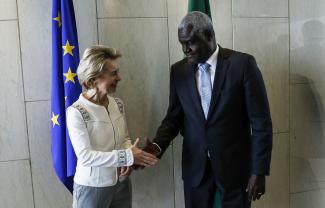Africa-Europe partnership
Building bridges

EU Commission President Ursula von der Leyen began her term in office with a highly symbolic move: during her first trip abroad, at the end of 2019, she visited the African Union (AU), a trip that was followed up in February 2020 by a meeting between members of the AU and EU Com-missions.
But more than half a year later, the momentum in African-European relations has dissipated. Neither the EU Commission nor the European governments have proposed forward-looking plans. Even under the German EU Council presidency, tangible efforts are lacking. Instead, contentious negotiations over the EU budget and the coronavirus recovery fund have revealed that the EU is ne-glecting its “partner countries” in the global south.
There are, however, many shared concerns that should be addressed: the response to the coronavirus pandemic, multilateralism and climate protection, fair trade relations and safe migration routes, gender and generational equality, stemming corruption and illicit financial flows, digitalisa-tion and participation, as well as confronting the colonial past.
At the AU-EU summit originally planned for the end of October, the course should have been set for a fair partnership. But the meeting has been postponed to 2021 at short notice as both sides seem to have other priorities. In one way or another, an “equal partnership” is only possible if local perspectives and voices play a central role. The postponement of the AU-EU summit now at least offers an opportunity to involve civil-society actors much more.
African and European civil societies are important actors who make constructive contributions to political processes, as their efforts during the coronavirus pandemic clearly show. Civil-society actors are helping to slow the spread of the virus and absorb its negative social impacts. In many African countries, initiatives like #FollowTheMoney (Nigeria) and 211CHECK (South Sudan) were developed to examine the use of coronavirus relief funds or information about the pandemic.
New forms of digital cooperation can help harness the knowledge of local people and promote political participation. VENRO, the umbrella organisation of development and humanitarian aid non-governmental organisations (NGOs) in Germany, tapped into this dynamic and organised the multi-week Digital Africa Forum. The discussions between approximately 70 NGOs from Africa and Europe formed the basis of a position paper on Africa-related policy addressed to the German EU Council presidency.
On 16 October, VENRO will also present the hybrid conference “Civil society driving change: Towards a new quality of the Africa-Europe partnership” with broad participation from policymakers and civil-society actors.
In its capacity as a digital bridge between the local and the policy level, civil society can render the African-European partnership more transparent and accessible. The over 1.6 billion people who will be impacted by the new Africa-EU strategy to be adopted at the next AU-EU summit will only benefit from it if participation is possible. For that reason, digital formats must support the inclusion of civil society.
Afterwards, meetings and projects will be needed in order to perpetuate relations between the two continents. The implementation of the AU-EU strategy must be reviewed on the basis of clear criteria and with the help of the Africa-EU Civil Society Forum. The forum’s mandate and capacities must be strengthened so that African and European representatives can participate equally in the monitoring process.
Germany’s federal government can already act on many of these points during its EU Council presidency. Doing so would be an important step toward raising the quality of African-European relations.
Bernd Bornhorst is the chairman of the Association of German Development and Humanitarian Aid NGOs (VENRO).
sekretariat@venro.org







